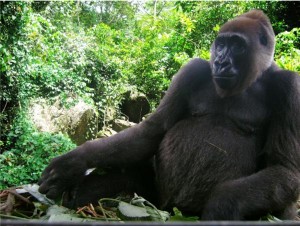ERUDEF GREAT APES CONSERVATION INITIATIVE:

Such alarming decline has prompted international organisations to begin advocating for the conservation of these large mammals in Cameroon. From 1990, organisations like World Conservation Society (WCS), Worldwide Fund for Nature (WWF), International Union for the Conservation for Nature (IUCN), amongst others, recorded little successes in their advocacy drive.
Consequently, national Civil Society Organisations (CSOs) entered the advocacy drive with special focus on protected areas management creation, and research. However, the validation of the Regional Action Plan for both Cross River gorillas and chimpanzees in 2007 and 2010respectively, have witnessed little or negligible support in executing the action plans.
The ERuDeF Great Apes Initiatives (EGAI) is therefore coming to fill this gap. EGAI is a Cameroonian initiative that seeks to provide long term economic and financial resilience to community institutions promoting great apes conservation in Cameroon.
While WCS provides a strong conservation science focus, WWF and IUCN provide a strong policy focus. ERuDeF, on its part, is leading the development and application of community based instruments inspired from citizen science to promote the conservation of great apes and other biodiversity as well as habitats management and restoration of landscapes. This cuts across the Northwest, Southwest, East and Adamawa Regions of Cameroon.
Cameroon harbours four of the great apes species in Africa. These include; the Cross River gorillas, Nigeria-Cameroon Chimpanzees, Central Chimpanzees and the Western lowland gorillas.
This Initiative therefore aims at conserving the declining population of Great Apes in Cameroon. It seeks to develop the management and implementation plans for Tofala Hills Wildlife Sanctuary, the proposed Mak-Betchou Wildlife Sanctuary, Kimbi-Fungom National Park, Tofala-Mone East corridor, the proposed Esimbi-Beba-Bafang Wildlife Sanctuary;
The Initiative is also out to create the proposed Mak-Betchou ,Esimbi-Beba-Bafang Wildlife Sanctuaries and the proposed TchabalMbambo National Park.

The Initiative will also establish and implement ecotouristic facilities in the various project sites, as well as ensure effective community development through the introduction of the Community Conservation Social Enterprise Development (CoCoSED) model.
At the end of this project, 4 new sites will be demarcated as a protected area, the management plan of 7 protected areas will be developed, and ecotourism and community development livelihoods will be developed in all the sites. All these will help increase the population of great apes in Cameroon.
The key beneficiaries of this Initiative include the local communities, the Government of Cameroon and the international communities
This project that will last for 5 years is estimated at $17 million. The potential funders for this project include ICFC, ACF, World land Trust and Rainforest Trust-USA.

The Organisation has been working in Lebialem Highland conservation complex and other protected areas in Cameroon for the past eighteen years using some of the most innovative solutions to conserve threatened and endangered wildlife species such as collaborative management approaches to support the creation and management of protected areas.
Key conservation achievements over the years include the creation of a conservation complex (Lebialem Highland Conservation Complex), and facilitating the creation of the Tofala Hill Wildlife sanctuary (which harbours the critically endangered Cross River Gorilla) in 2014, the first of its kind for a national NGO. The organisation is equally facilitating the creation of corridors in most protected area in Cameroon, to help allow genetic connective among species and for easy migrations. It works with the government of Cameroon through its concerned ministries such as the Forestry and Wildlife (MINFOF), Environment and Protection of Nature and Sustainable Development (MINEPDED), Agriculture and Rural Development (MINADER), and Tourism and Leisure.
Internationally, ERuDeF is collaborating with conservation organisations such as WWF, WCS, ACF, BRLi, and others. Furthermore, ERuDeF is one of the key partners involved in the support and collaborative management of the Mount Cameroon National Park in the Southwest region of Cameroon.



